
BULLETIN OF THE GEOLOGICAL SOCIETY OF DENMARK
metrics 2024
Advancing Geological Knowledge for a Sustainable Future
Introduction
BULLETIN OF THE GEOLOGICAL SOCIETY OF DENMARK, published by the Geological Society of Denmark, serves as a key platform for the dissemination of original research and comprehensive reviews related to geological studies in Denmark and beyond. With an ISSN of 2245-7070, this journal provides a significant avenue for sharing findings that contribute to our understanding of geological processes, resources, and the history of the Earth. Although it operates under traditional access options, the journal encourages a rich scholarly dialogue among researchers, professionals, and students alike. Its impact is evident in the broad scope it covers, catering to diverse areas of geology, including but not limited to sedimentology, paleontology, and environmental geology. By fostering an environment of knowledge sharing, the BULLETIN OF THE GEOLOGICAL SOCIETY OF DENMARK is not just a journal; it is a vital resource for anyone invested in advancing geological science.
Metrics 2024
 -
- 1.00
1.00 1.40
1.40 -
-Metrics History
Rank 2024
IF (Web Of Science)
JCI (Web Of Science)
Quartile History
Similar Journals
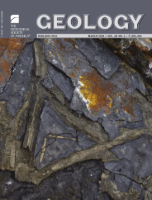
GEOLOGY
Connecting Researchers to the Heart of Earth's ProcessesGEOLOGY, published by the Geological Society of America, Inc, is a premier journal dedicated to advancing knowledge, research, and discussion in the field of geology. With an ISSN of 0091-7613 and an E-ISSN of 1943-2682, this journal stands out with an impressive Q1 ranking in Geology for 2023, positioning it among the top journals in the realm of Earth and Planetary Sciences, specifically holding a remarkable rank of 11 out of 321, reflecting its 96th percentile status. This journal aims to publish innovative research articles that cover all aspects of geology, from tectonics and sedimentology to paleontology and mineralogy, offering invaluable insights for researchers, professionals, and students alike. Although not currently open access, GEOLOGY maintains a rigorous review process ensuring the quality and integrity of the research it publishes. For more than five decades, spanning from its inception in 1973 to the upcoming publications in 2024, GEOLOGY has been instrumental in shaping the geological discourse and continues to be a vital resource for the scientific community.

GEOLOGICA BELGICA
Empowering Research in Earth and Planetary SciencesGEOLOGICA BELGICA is a distinguished open access journal dedicated to advancing the field of Earth and Planetary Sciences, published by Geologica Belgica Luxemburga Scientia & Professionis. With an ISSN of 1374-8505 and E-ISSN of 2034-1954, the journal has been a beacon of knowledge since its establishment in 1998, ensuring the broad accessibility of crucial research findings. Based in Brussels, Belgium, the journal is recognized for its impactful contributions and has achieved a commendable Q2 ranking in the Earth and Planetary Sciences category for 2023. This makes it a vital resource for researchers, professionals, and students alike, encouraging the dissemination of cutting-edge research. Spanning a diverse range of topics within its scope and converging from 2007 to 2024, GEOLOGICA BELGICA remains committed to fostering dialogue and collaboration among earth scientists globally, further enhancing its relevance and influence in this essential field of study.
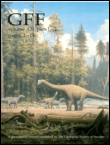
GFF
Connecting Scholars to the Rich History of Earth.GFF is a prestigious academic journal dedicated to advancing research in the fields of Geology and Paleontology. Published by Taylor & Francis Ltd in the United Kingdom, GFF serves as a vital platform for disseminating innovative findings and fostering discussions among researchers, professionals, and students alike. With a noteworthy impact factor reflecting its significance in the scientific community, GFF has achieved Q2 ranking in both Geology and Paleontology, underscoring its commitment to high-quality scholarship. The journal has been operational since 1872, accumulating a rich history of contributing to our understanding of earth sciences. It currently ranks #133 out of 321 in Earth and Planetary Sciences - Geology, and #50 out of 113 in Paleontology according to Scopus rankings. Although it does not offer an open access option, GFF remains accessible through various academic databases, ensuring that cutting-edge research reaches a wide audience. Its comprehensive scope aims to explore critical advancements in geological and paleontological sciences, making it an essential resource for those committed to exploring the intricacies of our planet’s past and present.

Geosphere
Pioneering Research for a Deeper Understanding of GeologyGeosphere is a premier open access journal published by the Geological Society of America, Inc., dedicated to advancing the fields of geology and stratigraphy. Since its inception in 2005, this journal has established itself as a critical platform for sharing high-quality research, evidenced by its robust positioning in the 2023 Scopus rankings, where it holds the 12th rank in stratigraphy and 75th in geology. With an impressive impact factor and a commitment to open access since 2018, Geosphere facilitates the dissemination of significant findings to a global audience, making it an essential resource for researchers, professionals, and students alike. The journal's scope includes a wide range of topics related to Earth and Planetary Sciences, encouraging interdisciplinary collaboration and innovation. Based in the United States, Geosphere continues to foster a community dedicated to understanding the Earth's processes and resources, ensuring that it remains at the forefront of geological research.

FACIES
Connecting Scholars to the Rich Tapestry of Earth SciencesFACIES is a prominent academic journal published by Springer, dedicated to advancing knowledge in the fields of Geology, Paleontology, and Stratigraphy. With its rich history since 1979 and an impactful convergence of research efforts extending through 2024, FACIES has established itself as a vital resource for scholars and practitioners. The journal boasts impressive ranking metrics: it is positioned in Q2 within Geology and Stratigraphy, and Q1 in Paleontology, reflecting its high-quality contributions to the academic community. Furthermore, its notable Scopus ranks—#28 in Paleontology, #16 in Stratigraphy, and #91 in Geology—underscore its influence and relevance. Although not an open-access journal, FACIES continues to provide significant findings that inform geological practices and enrich our understanding of past and present Earth systems. It serves as an essential platform for innovative research, making it invaluable for researchers, professionals, and students who seek to impact the fields of Earth sciences.
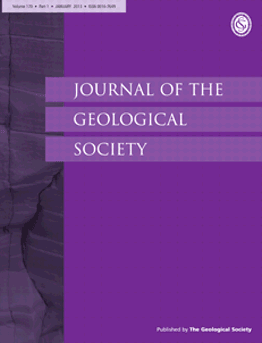
JOURNAL OF THE GEOLOGICAL SOCIETY
Pioneering Insights in Earth and Planetary SciencesJOURNAL OF THE GEOLOGICAL SOCIETY, published by GEOLOGICAL SOC PUBL HOUSE, is a premier academic journal dedicated to advancing the field of geology. With a rich history dating back to 1845 and continuously published until 2024, this journal caters to a diverse audience of researchers, professionals, and students involved in earth sciences. The journal is recognized for its high impact factor, situating it in the top Q1 category in the field of geology, as indicated by its impressive Scopus rank of #49 out of 321, positioning it at the 84th percentile in Earth and Planetary Sciences. This esteemed scholarly platform promotes rigorous peer-reviewed research, ensuring that novel findings contribute to the global geological discourse. Although it operates under a subscription model, the journal's archive offers valuable insights for anyone pursuing excellence in geological research. The JOURNAL OF THE GEOLOGICAL SOCIETY stands as a vital resource for disseminating scientific knowledge and fostering educational growth within the field.
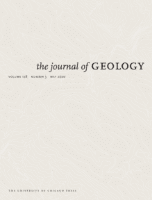
JOURNAL OF GEOLOGY
Charting New Territories in Geological Research.The JOURNAL OF GEOLOGY, published by University of Chicago Press, serves as a premier platform for disseminating groundbreaking research in the field of geology. Established in 1973, this esteemed journal has consistently ranked in the Q2 category in geology, further solidified by its Scopus ranking, where it is positioned at 99 out of 321 in Earth and Planetary Sciences, marking it in the 69th percentile of its category. With an emphasis on innovative and interdisciplinary studies, the journal features peer-reviewed articles that contribute to the understanding of geological processes, earth materials, and environmental interactions. Although it does not currently offer open access, it facilitates broad access through academic institutions to reach a global audience of researchers, professionals, and students striving to advance the knowledge of Earth's history and dynamics. As a vital resource for the geology community, the JOURNAL OF GEOLOGY plays an essential role in fostering scholarly dialogue and advancing both academic inquiry and practical applications in geology.
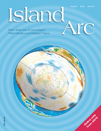
ISLAND ARC
Elevating Geological Insights Since 1992ISLAND ARC is a prestigious journal dedicated to the field of Geology, published by WILEY. With a strong focus on the geology of island arcs and other related research, it serves as a vital resource for scholars, professionals, and students interested in earth and planetary sciences. The journal, which has been in circulation since 1992, is indexed in Scopus and holds a commendable Q2 ranking in its category for 2023, indicating its significant impact within the geological community. The journal’s ISSN is 1038-4871 and its E-ISSN is 1440-1738. Although it does not currently offer open access, it remains a crucial platform for disseminating high-quality research relevant to geological phenomena, promoting interdisciplinary collaborations and advancing our understanding of geological processes. With an address in Hoboken, New Jersey, ISLAND ARC continues to enhance its global influence and scholarly contributions through rigorous peer review and a commitment to excellence.
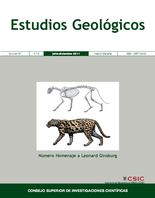
ESTUDIOS GEOLOGICOS-MADRID
Unlocking the Potential of Geological Research in Madrid.ESTUDIOS GEOLOGICOS-MADRID is a prominent journal in the field of geology, published by the esteemed Consejo Superior de Investigaciones Científicas (CSIC) in Spain. Established in 1976, this Open Access journal has been a vital resource for researchers and professionals since its inception. With an impact factor reflecting its contribution to the Earth and Planetary Sciences community, ESTUDIOS GEOLOGICOS-MADRID currently holds a Q3 category ranking in Geology as of 2023, showcasing its relevance and quality within the discipline. The journal publishes a diverse array of geological studies, ensuring wide-reaching access to significant research findings, thereby promoting collaboration and knowledge sharing. Established as a platform for both foundational research and applied geology, this journal fosters academic growth and contributes to understanding the Earth’s processes. Researchers, professionals, and students are encouraged to explore its extensive archive, which includes publications from 1976 to the present. For more information, visit the journal's editorial office at Editorial CSIC, C/VITRUVIO 8, 28006 MADRID, SPAIN.

Boletin de la Sociedad Geologica Mexicana
Fostering Innovation in Earth and Planetary SciencesBoletin de la Sociedad Geológica Mexicana is a prestigious open-access journal published by the Universidad Nacional Autónoma de México through its Institute of Geography. As a prominent platform in the field of Earth and Planetary Sciences, this journal has been disseminating valuable research since 1904, facilitating the sharing of knowledge among researchers, professionals, and students alike. With a significant impact on the scientific community, it is categorized in the third quartile (Q3) of Earth and Planetary Sciences, and continues to uphold a commitment to accessible science during its current converged years from 2008 to 2024. Positioned in Mexico, it plays a crucial role in addressing regional geological studies while contributing to global scientific discourse. The journal’s emphasis on high-quality, peer-reviewed articles demonstrates its importance as a reliable resource for advancing geological research and education.